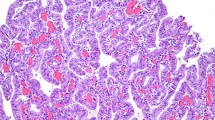Abstract
To investigate the colonic adenoma-adenocarcinoma progression sequence, DNA ploidy analysis was performed on hyperplastic polyps to adenocarcinomas. DNA ploidy data were then compared with immunocytochemical staining for proliferating cell nuclear antigen (PCNA). In hyperplastic polyps to villous adenomas, all cases were diploid except one aneuploid villous adenoma. In three adenomas, diploidin situ adenocarcinomas were present. As diploid percentages decreased from hyperplastic polyps to villous adenomas, aneuploid percentages increased. In adenocarcinomas, the Dukes classification corresponded well to DNA ploidy status: all four stage A carcinomas were diploid, whereas three cases each of stage C1 and C2 carcinomas were aneuploid or multiploid. A surprising finding was that S-phase percentage in adenocarcinomas was not parallel with PCNA-positive tumor cell numbers. It is concluded that multistep adenoma-adenocarcinoma progression was partially reflected in DNA ploidy pattern from hyperplastic polyps to villous adenomas. In adenocarcinomas, the Dukes classification paralleled well the DNA ploidy status from stage A diploid to stage D aneuploid, but was not accompanied by increasing PCNA-positive cell numbers.
Similar content being viewed by others
References
Fearson EC, Vogelstein B: A genetic model for colorectal tumorigenesis. Cell 61:759–769, 1990
Koha M, Wilkstrom B, Brismar B: Colorectal carcinoma DNA ploidy pattern and prognosis with reference to tumor DNA heterogeneity. Anal Quant Cytol Histol 14:367–372, 1992
Silvestrini R, D'Agnano I, Faranda A, Costa A, Zupi G, Cosimelli M: Flow cytometric analysis of ploidy in colorectal cancer: A multicentric experience. Br J Cancer 67:1042–1046, 1993
Steinbeck RG, Heselmeyer KM, Neugebauer WF, Falkmer UG: DNA ploidy in human colorectal adenocarcinomas. Anal Quant Cytol Histol 15:187–194, 1993
Bosari S, Lee AK, Wiley BD, Heatley GJ, Silverman ML: Flow cytometric and image analysis of colorectal carcinomas. A comparative study with clinical correlations. Am J Clin Pathol 99:187–194, 1993
Bosari S, Lee AK, Heatley GJ, Hamilton WM, Silverman ML: DNA quantitation by image analysis of paraffin embedded colorectal adenocarcinomas and its prognostic value. Mod Pathol 5:324–328, 1992
Bell SM, Scott N, Cross D, Sagar P, Lewis FA, Blair GE, Taylor GR, Dixon MF, Quirke P: Prognostic value ofp53 overexpression andc-ki-ras gene mutations in colorectal cancer. Gastroenterology 104:57–64, 1993
Wilcox GM, Anderson PB, Colacchio TA: Early invasive carcinoma in colonic polyps: A review of the literature with emphasis on the assessment of the risk of metastasis. Cancer 57:160–171, 1986
Morson BC, Daswson IM, Day DW, Jass JR, Price AB, Williams GT: Benign epithelial tumours and polyps.In Morson and Dawson's Gastrointestinal Pathology, 3rd ed. Oxford, Blackwell Scientific, 1990, pp 563–596
Morson BC, Dawson IM, Day DW, Jass JR, Price AB, Williams IM: Malignant epithelial tumours.In Morson and Dawson's Gastrointestinal Pathology, 3rd ed. Oxford, Blackwell Scientific, 1990, pp 597–629
Tomita T:p53 and proliferating cell nuclear antigen in islet cell tumors and carcinoids (submitted)
Bacus SS, Goldschmit R, Chin D, Moran G, Weinberg D, Bacus J: Biological grading breast cancer using antibodies to proliferating cells and other markers. Am J Pathol 135:783–792, 1989
Astler VB, Coller FA: The prognostic significance of direct extension of carcinoma of the colon and rectum. Ann Surg 139:846–852, 1954
Fearson ER, Hamilton SR, Vogelstein B: Clonal analysis of human colorectal tumors. Science 238:193–197, 1987
Quirke P, Fozard JBJ, Dyson JED, Giles GR, Bird CC: DNA aneuploidy in colorectal adenomas. Br J Cancer 53:477–481, 1986
Goh HS, Jass JR: DNA content and the adenoma-carcinoma sequence in the colorectum. J Clin Pathol 39:387–392, 1986
Banner BF, Chacho MS, Roseman DL, Coon JS: Multiparameter flow cytometric analysis of colon polyps. Am J Clin Pathol 87:313–318, 1987
Murad T, Bauer K, Scarpelli D: Histologic and flow cytometric analysis of adenomatous colonic polyps. Arch Pathol Lab Med 113:1003–1008, 1989
Linden MD, Torres FX, Kubus J, Zarbo RJ: Clinical application of morphological and immunocytochemical assessment of cell proliferation. Am J Clin Pathol 97:S4-S13, 1992
Hollstein M, Sidransky D, Vogelstein B, Harris CC:p53 mutation in human cancers. Science 253:49–53, 1991
Bartek J, Bartkova B, Vojtesek B, Staskova Z, Lukas J, Rejthar A, Kovarik J, Midley CA, Gannon JV, Lane DP: Aberrant expression of thep53 oncoprotein is a common feature of a wide spectrum of human malignancies. Oncogene 6:1699–1703, 1991
Porter PL, Gown AM, Kramp SG, Coltrera MD: Widespreadp53 overexpression in human malignant tumors. Am J Pathol 140:145–153, 1992
van den Berg FM, Tigges AJ, Schipper MEI, Den Hartog-Jager FCA, Kroes WGM, Walboomeers JMM: Expression of the nuclear oncogenep53 in colon tumours. J Pathol 157:193–199, 1989
Bernett WP, Sollstein ML, He A, Zhu SM, Resau JH, Trump BF, Metcalf RA, Welsh JA, Midgley C, Lane DP, Harris CC: Archival analysis ofp53 genetic and protein alterations in Chinese esophageal cancer. Oncogene 6:1779–1784, 1991
Louis DN, von Deimling A, Chung RY, Rubio MP, Whaley JM, Eibl RH, Ohhashi H, Wiestler OD, Thor AD, Seizinger BR: Comparative study ofp53 gene and protein alterations in human astrocytic tumors. J Neuropathol Exp Neurol 52:31–38, 1993
Steck DA, Bruner JM, Pershouse MA, Hadi A, Conrad CA, Yung WK, Saya H: Molecular, genetic and biological aspects of primary brain tumors. Cancer Bull 45:296–303, 1993
Author information
Authors and Affiliations
Rights and permissions
About this article
Cite this article
Tomita, T. DNA ploidy and proliferating cell nuclear antigen in colonic adenomas and adenocarcinomas. Digest Dis Sci 40, 996–1004 (1995). https://doi.org/10.1007/BF02064188
Received:
Accepted:
Issue Date:
DOI: https://doi.org/10.1007/BF02064188




